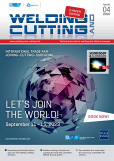Adhesive bonding of thin-walled magnesium die cast components
Authors: M. Sc. Christin Koch, M. Sc. Husam Sharabi, Dr.-Ing. Martin Kahlmeyer, Prof. Dr.-Ing. Prof. h. c. Stefan Böhm, Prof. Dr.-Ing. Martin Fehlbier
DOI: https://doi.org/10.53192/WAC202204282
Using components made of magnesium die casting, weight can be reduced by approx. 70% compared to steel constructions [1]. In order to exploit the advantages of using magnesium in lightweight construction, corrosion-resistant joining techniques play an essential role but are influenced by various factors. However, the casting skin resulting from the casting process and release agent residues make a surface pre-treatment necessary before bonding. Without pre-treatment adhesive failure and low bond strength occurs [2]. Until now chemical pre-treatment processes such as conversion coatings have played the most important role in the pre-treatment of magnesium. Due to health hazards and the complex process flow, which usually consists of several work steps, it is of utmost importance to identify and investigate suitable alternatives. This study investigates the influence of surface treatments such as laser and plasma polymerisation on the mechanical properties of adhesive joints. The results demonstrate the necessity of pre-treatment and how strength and durability of bonding can be enhanced.
An active subscription enables you to download articles or entire issues as PDF-files. If you already are a subscriber, please login. More information about the subscription












